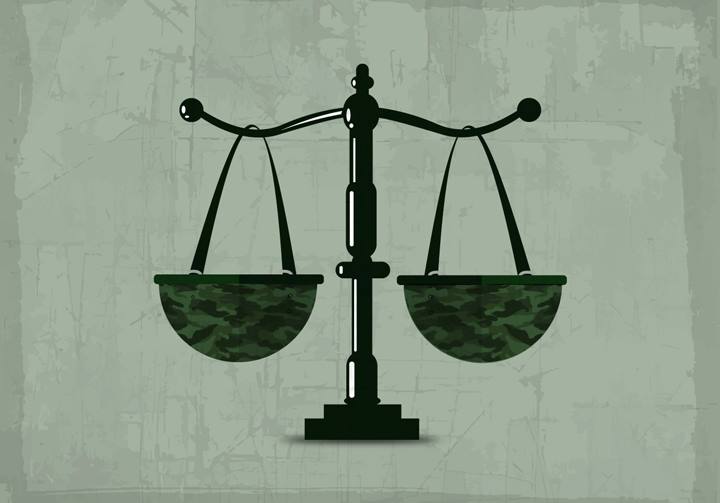ISLAMABAD:
The seven-member constitutional bench of the Supreme Court, headed by Justice Aminuddin Khan, on Thursday raised doubts over the decision-making process by military courts while seeking details of civilians tried in those courts so far.
During the intra-judicial appeal hearing against the high court’s decision on the military trial of civilians, the judges said the court wanted to look at the procedure and whether the requirements of a transparent trial in the military court were met.
Defense Ministry lawyer Khawaja Haris continued his arguments. He said that procedure was followed in military trials. In this regard, Judge Hassan Rizvi noted that the court had requested the minutes of the military proceedings because it wanted to see how the decision on evidence was made in the trial.
Judge Muhammad Ali Mazhar noted that the court also wanted to check the procedure and whether the requirements of a transparent trial in the military court were met. Haris said neither the high courts nor the Supreme Court could review the merits.
He added that a case file would be shown to the court for review. Justice Rizvi said the court should not discuss the evidence presented in the trial, but emphasized that under the natural justice system no one can be sentenced without being heard.
Haris said the five-judge bench of the Supreme Court, which ruled against the military trial of the civilians, did not properly assess the point of admissibility. He added that the court could not even review the substance of the trial file.
Judge Jamal Mandokhail asked whether the law on military trials of civilians could be changed. Justice Muhammad Ali Mazhar highlighted that the constitutional article on fair trial was published in 2010, while the Code of Criminal Procedure (CrPC) was published in 1898, which lays down the complete procedure for a trial.
Justice Mandokhail raised the question as to what was the purpose of enacting the Army Act. Haris said the purpose of the Army Act was to ensure that there were no obstacles in the activities of the armed forces. He added that the process of improving the law continues.
Justice Naeem Afghan commented that the Army Act referred to officers and soldiers of the armed forces, but its Section 2 was amended in 1967 and the words “any person” were added, after which retired officers were also under the scope of military trial. .
He noted that if this Section 2 remained invalid, then a military trial of any retired officer would not be possible, adding that if a retired person was undergoing a military trial, that would also end. He said that even after the introduction of Article 10A in the Constitution, there was talk of fair trial in the courts.
Khawaja Haris said the constitutional amendment was enacted for other reasons. Justice Mandokhail on Friday (today) asked the Defense Ministry’s lawyer to try to complete his arguments. The hearing was later postponed.
On the other hand, a three-member regular bench of the Supreme Court adjourned the hearing of a case related to Article 191A.
Heading the court, Justice Mansoor Ali Shah said the case had not been settled before the same regular court that heard the case on January 13.




